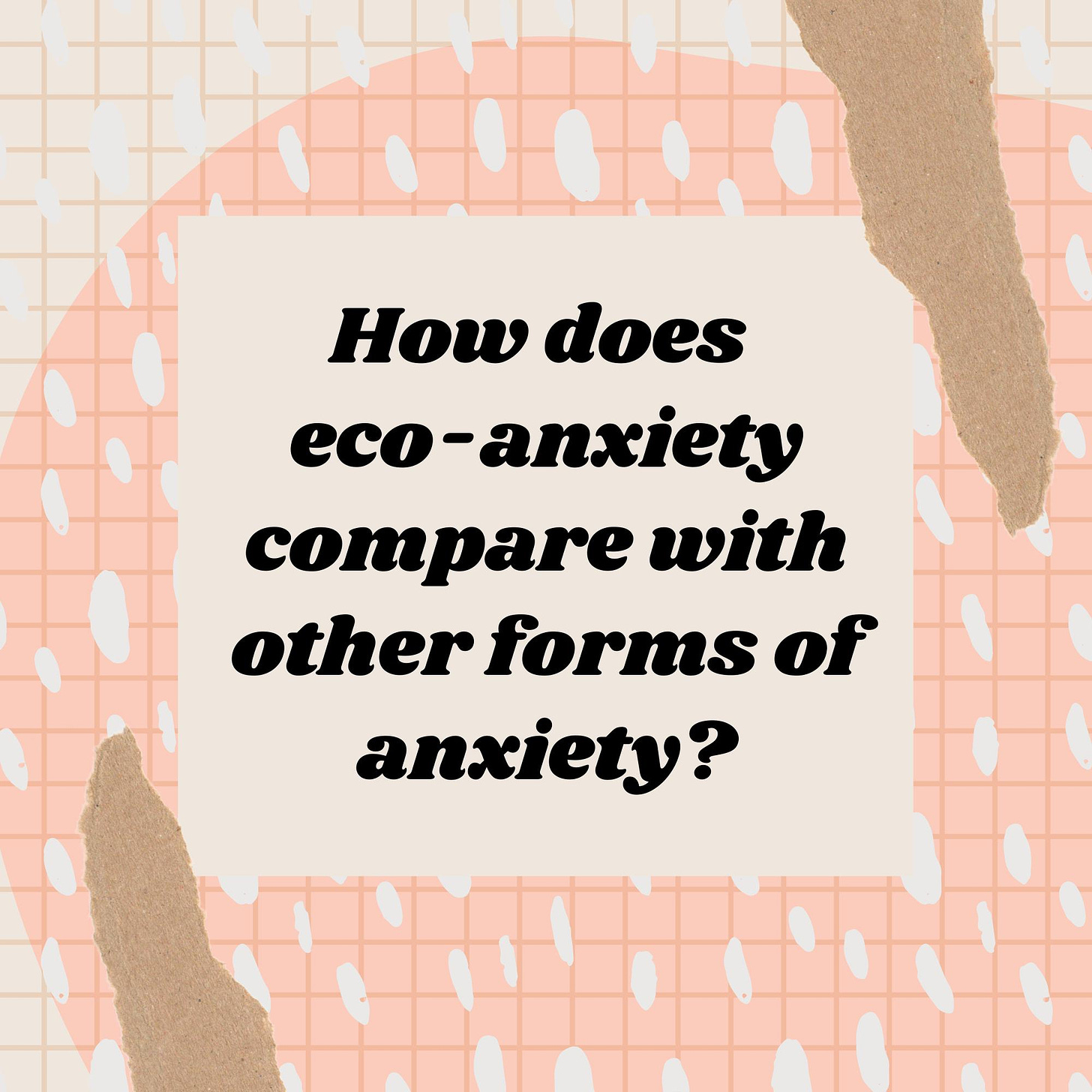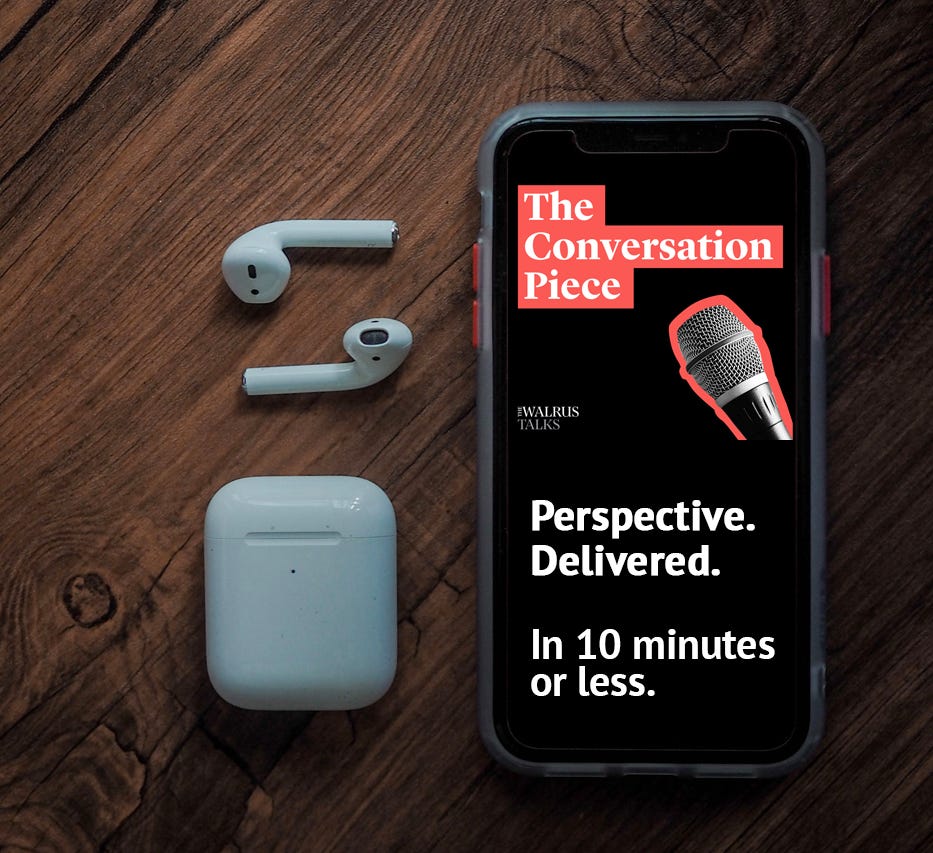How does eco-anxiety compare with other kinds of anxiety?
The term has exploded in the media and experts want clarity on what it means
Hi there, welcome to another edition of Gen Dread!
In the last few years, specifically since 2018, there’s been a surge of public discussion about eco-anxiety and climate anxiety. Events that triggered this include the 2018 IPCC report that outlined the difference between a world at 1.5 and 2 degrees (which was etched into people’s minds as saying “we only have 12 years to avert climate catastrophe”), the rise of Greta Thunberg and her story of turning severe climate anxiety into action, the growth of the youth climate movement in general, Extinction Rebellion’s full throttle approach to sounding the alarm on the climate emergency, amongst other things). Now that major outlets (New York Times, Vogue, the Guardian, and CNN to name a mere few) have propagated the conversation around eco-anxiety and climate anxiety, it is worth slowing down to ask what is special about these forms of anxiety. Is anxiety about the environment different from other types of anxiety, after all?
I’ve written here before about the limitations of the term climate anxiety when it is used to describe globally diverse experiences with environmental change, as well as why eco-anxiety is very reasonable to feel and not something to be “cured”. But there’s still so much more to unpack. Thankfully eco-anxiety researcher Dr Panu Pihkala, a Professor at the University of Helsinki, can help us think about these terms in more depth. He recently offered a nuanced take on this issue based on the latest eco-anxiety research, in Anxiety and the Ecological Crisis: An Analysis of Eco-Anxiety and Climate Anxiety, published last month.

Here are some of its key takeaways:
Eco-anxiety and climate anxiety, as concepts, have many dimensions and are difficult to pin down; we should be cautious to not develop an overly narrow view of what they mean, particularly as ecological issues are now becoming increasingly tied with healthcare
The most commonly used working definition of eco-anxiety comes from the American Psychological Association and EcoAmerica’s 2017 Mental Health and Our Changing Climate report, where they describe it as “the chronic fear of environmental doom” (climate anxiety has been described as a form of relatively intense eco-anxiety about the climate)
In pop culture, eco-anxiety has become a catch all term for many kinds of eco-feelings, not just anxiety (read: grief, shame, guilt, overwhelm, sorrow, fear, anger, hopelessness, etc); scholars are divided on whether it is problematic or not that this catch-all phrasing has arisen to describe such intimately connected emotions, instead of having more specific (and less pathologizing) terms
Uncertainty, unpredictability, and uncontrollability are important factors in eco-anxiety (as with all anxiety)
Eco-anxiety is closely related to fear and worry, yet still distinct (where fear stems from a concrete and acute threat, anxiety is a constant or longer-term sense of being troubled by uncertainty, while worry is often a less intense emotion than anxiety)
Pre-existing anxiety sensitivity may have a role in how eco-anxiety shows up in one's life
Trends show special vulnerability for farmers, climate scientists, and members of frontline communities
One’s experience with eco-anxiety gets shaped by socio-cultural factors, power dynamics and justice issues; Pihkala notes that going forward, it will be vital to study “the experiences of those people who do not recognize—or do not have the time to think about—their eco-anxiety”
Most manifestations of eco-anxiety are not pathological, highlighting the need to be careful in how it is framed in the media and other conversations; it is thus misleading to think of it as an anxiety disorder, “eco-anxiety is actually a moral emotion: it is based on an accurate appraisal of the severity of the ecological crisis”
Psychiatry does not yet have a lot to say about pathological forms of eco-anxiety that though rare, can arise (work in this vein is being explored and so far, most psychiatry research about the climate has dealt with acute trauma from climate disasters); attempts have been made to separate climate despair from clinically defined depression
Eco-anxiety can be thought of as a type of existential anxiety “a mental state related to being human and wrestling with fundamental questions in life, as in definitions by existential philosophers and existential psychologists”
Eco-anxiety connects with Anthony Giddens’ theory of “ontological security”, which says that deep feelings of security or insecurity have profound consequences for people’s behaviour and wellbeing; the climate and wider eco-crisis can make people’s very existence and future feel insecure, causing anxiety, depression, or defensive reactions
COVID anxiety and eco-anxiety share some similarities; experts have suggested accepting mortality and uncertainty as ways of coping with COVID anxiety, which also applies in the context of eco-anxiety
Eco-anxiety can be a problem when it paralyzes someone (into inaction), but it can also be practical when it causes a person to gather new information, reassess their life (i.e. find a deeper purpose) and make important behaviour changes
Lastly, he raises the point I always find vital to get across when discussing eco-anxiety: “Participatory action is often recommended as an important antidote to paralyzing anxiety...however, because global ecological problems cannot be solved in the near future, there is a need for skills of living with anxieties and distress. For this reason, there have emerged discourses about resilience, post-traumatic growth, and adaptation skills in relation to eco-anxiety and climate anxiety”
Adaptation skills
If you’re interested in exploring ideas around adaptation skills in relation to eco-anxiety and climate anxiety, you’re in luck! Gen Dread readers Dr Sarah Jaquette Ray, Dr Jennifer Atkinson and others have put together an Existential Toolkit for Climate Justice Educators that gets into some of these issues. It features educators from around the world and is happening this fall. You can check out the different sessions and find out how to get your name on the list here.
Be part of the conversation
What do you want to see covered in more depth when it comes to the psychological impacts of the climate and ecological crisis? Let me know. I love hearing from readers! I always find a way to respond.
You can follow me on Instagram, hit me up on Twitter, or reply to this email if you’re already subscribed.
Help get people psyched about climate
Please show some love by sharing Gen Dread, the newsletter about staying sane in the climate crisis. Thanks!
Gen Dread is happy to lift up The Conversation Piece, a podcast from The Walrus (my favourite magazine from my homeland). The Conversation Piece features some of the most engaging and fascinating thought leaders in Canada.





Eco anxiety announces the end of human civilization and history. Thus, I call it "Apocalyptic anxiety."